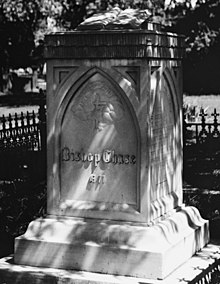Philander Chase
Philander Chase (December 14, 1775 – September 20, 1852) was an Episcopal Church bishop, educator, and pioneer of the United States western frontier, especially in Ohio and Illinois.
Thomas Ellison, rector of St. Peter's Church in Albany, New York, while supporting himself teaching at the newly organized city school.
The younger Chase then entered Cincinnati College and went on to become a statesman and jurist, including Chief Justice of the United States.
Wetmore found himself unsuited to the rigorous travels, and settled at Schenectady, while Chase continued evangelizing on horseback, as well as baptizing, preaching and otherwise meeting the needs of widely scattered Episcopalians and other Protestants in the more rural areas from Troy to Lake George to Auburn and Bloomfield.
Chase accepted a position to serve congregations in Poughkeepsie, New York and relatively nearby Fishkill, NY.
Provoost ordained him as a priest at St. Paul's Church in New York City on November 10, he called for his wife to join him.
Samuel Seabury had founded as a mission more than three decades earlier, but whose Loyalist rector had left during the American Revolution.
Chase accepted a challenge to establish the first Episcopal congregation in Louisiana, becoming the founding rector of what ultimately became Christ Church Cathedral, New Orleans.
[7] After three months, Jack escaped, boarding a steamer bound for Liverpool, "a hard blow and humiliating as well" for Chase.
[8] When Mary's health seemed to improve, and wanting to oversee the further education of their sons George and Philander at the Cheshire Academy, the Rev.
[9] Chase continued to feel a call to evangelize and remained deeply interested in the religious condition and prospects of the westward pioneers.
[11] Chase traveled east for ordination that winter, but was forced to defend his character before the Standing Committee would give its assent.
Bishop Chase returned on horseback to his diocese, conducting a service at Zanesville on the National Road on February 28 and reaching his home in early March.
[9] In October 1823, Chase even sailed to England armed only with a letter of introduction from Henry Clay to raise funds for his frontier diocese, especially his planned school and seminary.
The foundation was somewhat bittersweet, for Philander Chase Jr., who had become an Episcopal priest like his father and accepted a position in South Carolina, died.
Chase hoped to establish a self-sufficient community free of urban vices such as drinking and dancing, which would help students to focus on their studies.
His wife Sophia not only cooked for the students, did their laundry and nursed them, but kept the school running during her husband's many fundraising trips.
[17] Chase then moved his family about twenty miles away, to a farm he had purchased near Millersburg, which he called the "Valley of Peace".
[18] Fundraising proved more difficult this time, so Chase undertook another tour, this time in the southern states while his cousin Samuel handled operations, his sons Henry, Philander and Dudley handled the farm and sheep, and his daughter Mary ran a small girls' boarding school.
Chase spent the final years of his life founding Jubilee College and the surrounding frontier community near present-day Peoria, Illinois.
After service as a chaplain in the Civil War, Samuel Chase attempted to revive the college, but failed and sold off some land in 1871.
